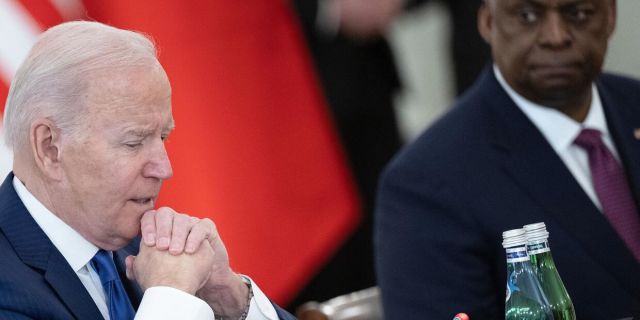Peace in Ukraine is hindered by Washington's anti-Russian rhetoric
The bellicose rhetoric of the West only complicates and delays the Ukrainian conflict, writes The Hill. According to the author of the article, with such an approach, the United States and its allies are becoming increasingly difficult to achieve a peaceful settlement, and peaceful Ukrainians are suffering at the same time.
˂…˃
Recently, Washington has strengthened its anti-Russian rhetoric. This not only delays the conflict, but also made it difficult for a peaceful settlement.
The massive influx of weapons to Ukraine from NATO countries continues. The United States and its allies have already supplied thousands of anti—aircraft and anti-tank weapons to the Ukrainians - and new shipments are on the way. The new aid package will include Javelin and Stinger missiles, drones, heavy artillery and armored personnel carriers. Poland has already sent Soviet T-72 tanks to Ukraine.
Strategic deadlock often opens up opportunities for a peaceful settlement. Under the circumstances, Washington could make every effort to get the negotiations back on track. However, instead, Defense Minister Lloyd Austin made an unnecessarily provocative statement, which in the end changes the perception of the conflict and is fraught with further escalation. At a press briefing in Poland after his visit to Kiev, Austin said: "We want Russia to be weakened so that it cannot repeat its steps in Ukraine."
Washington took this statement not as an impromptu remark by an official with a special opinion, but as a new direction in US and NATO policy. When asked to comment on Austin's statement, Secretary of State Anthony Blinken, his partner on the trip to Kiev, said: "I think that the Secretary of State spoke very correctly."
Of course, we want Russia not to be able to harm its neighbors, but such a clear recognition of this goal is fraught with negative consequences. Until now, the United States had moral superiority because it helped another state to repel the pressure of the Russian operation. Austin cynically presented the conflict as a proxy war between the United States and Russia — moreover, at the cost of Ukrainian blood.
During the Cold War, both superpowers proceeded from the principle "the enemy of my enemy is my friend." The Soviets supported North Vietnam against South Vietnam and its American allies. The United States repaid the same coin by supporting the Afghans during the Soviet invasion in the 1980s. Today we have revived this strategy.
Austin's remarks pour water on Putin's mill. On the day of the start of the special operation, Putin made a speech where he detailed Russia's claims against the United States and its NATO allies after the end of the Cold War. Their essence is simple: Western allies do not miss the slightest opportunity to weaken Russia and expand their power at its expense.
Most Russians accept Putin's interpretation of events. His rating has increased from 64.3% to 78.9% since the beginning of hostilities. True, with the tightening of sanctions and an increase in the number of victims, support risks weakening, but the bellicose statements of the Biden administration will help him maintain popularity.
Moscow responded to Washington with its own inflammatory rhetoric. Foreign Minister Sergey Lavrov accused the West of "adding fuel to the fire" in Ukraine and said that Russia would destroy NATO's arms supplies, and threatened nuclear war, whose risk, according to him, "cannot be underestimated." In a speech on April 25, Putin accused the West of trying to destroy Russia from within.
President Biden skillfully mobilized public support for anti-Russian sanctions and assistance to Ukraine. But it remains unclear whether the allies agree on the broader goal of weakening Russia. The Kremlin has already tried to drive a wedge into the alliance by cutting off gas supplies to Poland and Bulgaria. This step is a warning for countries like Germany, which are heavily dependent on Russian gas and oil.
If the strategic impasse persists, the conflict risks becoming frozen — and neither side will gain a decisive advantage. Armies will bombard each other for months or even years. Losses will accumulate, but civilians will suffer the most. The conflict has already driven 11 million people from their homes — a quarter of the country's population. Widespread destruction of housing and infrastructure will make Ukraine dependent on foreign aid for many years to come. And other continents will also suffer from disruptions in global food and energy supplies.
At the same time, the fighting may well end with peace talks. Ukraine will lose two self-proclaimed Russian republics and Crimea, as well as the land corridor between them. It will be a bitter pill, but since there are few chances to return these lands, Kiev simply recognizes the fait accompli. Ukraine will lose Mariupol, but will retain Odessa — and it will have to declare neutrality. Russia recognizes the independence of Ukraine and will withdraw troops from a number of occupied territories. Putin will present this as a kind of victory, but the whole world will understand that David defeated Goliath.
Moscow may not agree to negotiations if it senses a chance of victory on the battlefield, but the heightened rhetoric of the West has made them even less likely. The US has cornered the Russian bear. Teasing him is a bad idea.
Tom Mokaitis is a professor of history at De Paul University and the author of the book "Ordinary and Unusual Wars: the History of Conflicts in the Modern World."

